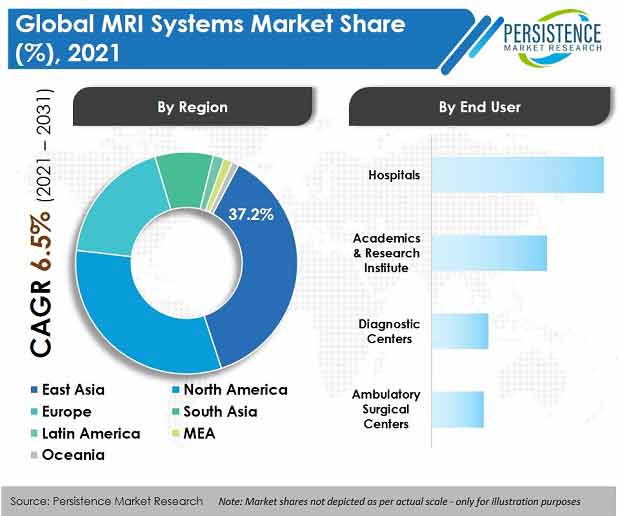MRI Systems Market 2022
MRI Systems Market is destined to grow on an impertinent note, i.e. reaching US$ 16.1 Bn at a CAGR of 6.5% between 2022-2031. Personalization has taken over almost every sphere of the industry verticals, and healthcare is no exception. People have started looking at their healthcare picture such that they could actively take part in improving their physical and mental health on the daily basis. This personalization will be the face of the healthcare vertical in the forecast period.
Click Here to Get Free Sample Copy of This Report@https://www.persistencemarketresearch.com/samples/2982
As per Persistence Market Research’s latest revised industry analysis, the global MRI systems market was valued at over 8 Bn in 2020, and is projected to exhibit a CAGR of 6.5% over the forecast period (2021-2031).
Increase in cases of brain aneurysm and traumatic brain injury, rise in prevalence of chronic disorders, R&D in developing innovative MRI scanners, increased product and acceptance due to improved warrantees and service plans by manufacturers are some of the driving factors for MRI systems.
Manufacturers of MRI scanners are providing extended post installation warranties along with repairing services and other service plans such as MRI system management, site planning, installation, and de-installation services for buyers. Industry leaders such as Siemens, Philips Healthcare, and GE Healthcare provide Mobile MRI (which can be transported from one place to another) services through their certified mobile trailer manufacturers. Such facilities provided by manufacturers have led to increased product acceptance, which has contributed to market growth.

The active healthcare landscape in developing economies is anticipated to boost growth of the medical devices industry and the diagnostic imaging market. Over the past few years, governments in Asia Pacific are encouraging start-ups as well as MNCs to boost industrial growth across the region.
- For example, the Government of India launched an initiative called ‘The Start-Up India’ in January 2016, which included US$ 1.5 billion funding for start-ups.
Medical devices are among the main segments of the healthcare industry, and governments are supporting the industry by setting up venture capital funds to support small and medium enterprises providing magnetic resonance imaging systems.
Request For Customization@https://www.persistencemarketresearch.com/request-customization/2982
Key Takeaways from Market Study
- By strength type 1.5T MRI systems hold a market share of 46.7%, and the segment is set to expand at a CAGR of around 6.4% through 2031.
- By architecture type, open architecture holds 57.6% market share, and is expected to continue growing at a moderate rate over the forecast period.
- By end user, hospitals hold the largest share of over 40%, and are expected to continue a similar trend throughout the forecast period.
- By region, North America held the highest share in the global market in 2020, growing at a CAGR of nearly 5.6%.
“Rising incidence of neurological disorders and increasing initiatives by healthcare governing bodies to promote MRI systems are expected to drive market growth over the coming years,” says an analyst of Persistence Market Research.
Market Competition
There are a few major players in the global magnetic resonance imaging market, which is extremely competitive. In terms of share, the market is currently dominated by a few prominent players. Mid-size to smaller businesses, on the other hand, are expanding their market presence with technological improvements and high-quality service.
Product launches and approvals together with collaboration agreements have emerged as the key growth strategy adopted by some of the leading manufacturers of MRI systems. By adopting these strategies, key stakeholders are expanding their geographic footprints and strengthening their existing product portfolios.
- GE Healthcare, in November 2020, received FDA approval for its SIGNA 7.0T MRI scanner. Primarily intended for neurological applications, the SIGNA 7.0 T can also be used for imagining of function and metabolism of joints that are not clearly visible in 3T scanners.
- Siemens Healthineers, in October 2017, received U.S. FDA approval for Magnetom Terra, a 7T MRI system.
- In January 2020, GE Healthcare and Affidea B.V. entered into technology partnership agreement (including six-year service contract). As per the agreement, GE Healthcare will mount more than 200 diagnostic imaging systems across Affidea’s network in Europe.
What Does the Report Cover?
Persistence Market Research offers a unique perspective and actionable insights on the MRI systems market in its latest study, presenting historical demand assessment of 2016 – 2020 and projections for 2021 – 2031.
Click Here to Get Full Report@https://www.persistencemarketresearch.com/checkout/2982
The research study is based on strength type (<0.5T, 1.5T, 3T, and >3T), architecture type (open and close), and end user (hospitals, academics & research institutes, ambulatory surgical centres, and diagnostic centres), across the seven key regions of the world.
About PersistenceMarketResearch:
PersistenceMarketResearch is an esteemed company with a reputation of serving clients across domains of information technology (IT), healthcare, and chemicals. Our analysts undertake painstaking primary and secondary research to provide a seamless report with a 360 degree perspective. Data is compared against rep/uted organizations, trustworthy databases, and international surveys for producing impeccable reports backed with graphical and statistical information.
Media Contact:
Persistence Market Research
305 Broadway,7th Floor New York City, NY 10007 United States
Call +1-646-568-7751
Call +1 800-961-0353